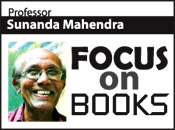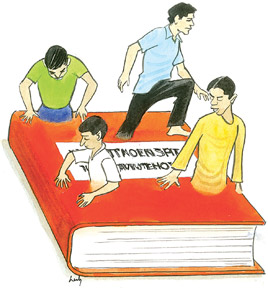Profiles for a better life
 "I want my little son to grow up with a knowledge on the lives of
great people who lived in the past and those who live today," said the
mother known to me, buying a whole pile of mini books from a bookshop.
The list included names such as Einstein, Lincoln, Darwin, Marx, Marconi
and a host of other names. I was simply surprised at this event. "I want my little son to grow up with a knowledge on the lives of
great people who lived in the past and those who live today," said the
mother known to me, buying a whole pile of mini books from a bookshop.
The list included names such as Einstein, Lincoln, Darwin, Marx, Marconi
and a host of other names. I was simply surprised at this event.
"Are you not interested in stories and poems, and other supplementary
readers?" I asked.
The smiling mother responded.
"My son has enough of those books. But he should know how people
became great during their lifetime."
How one became great may be a debatable issue. A great personality
for one may not be the same for another. But the simple ideology remains
static. We are interested on knowing how a person achieved a greater
state over the others. What are the factors that led one to be
considered great?
[SUBHEAD] Great people
The terms 'profile studies' or 'halo studies' are known by the
students of social sciences and humanities in most universities and
higher seats of learning around the globe. The students are made to
rediscover the events in the lives of great people and innovators, to
achieve better perspectives on their visions.
 But someone will say that bookshops and libraries are stacked with
thousands of biographies written down the centuries. But someone will say that bookshops and libraries are stacked with
thousands of biographies written down the centuries.
True enough, they have to be seen from a new perspective from time to
time. The biography of Charles Darwin which we have read at school could
be seen from a different standpoint today. Physical sciences and
interlinked subject areas of the subject have changed over the years
paving the way for new visions and rediscoveries.
What made Darwin perceive the vision of evolution from today's
standpoint might be a pertinent factor. Similarly many more questions
could be raised. Great medical doctors have been discoverers in the
field of medicine. Reading their profiles or biographies, one may tend
to know more about them and the embedded subject matter from several
viewpoints. Iris Murdoch, the English novelist, wrote a sort of a
biography of French philosopher Jean Paul Sartre. It was an eye opener
to the reader on matters pertaining to the philosophy of existentialism
and creativity.
Conventional biographer
The attempt was more a rediscovery of what Sartre said, rather than a
mere picture of his life from a conventional biographer's point of view.
Brief encounters with great people have led to the writing of the life
and thoughts of person who changed the world scene from what it used to
be. My good benefactor, the consultant cardiologist Dr Ruvan Ekanayaka,
says that he admires the great ideology of Chief Seattle, the Red Indian
who could be observed as the greatest pioneer of environment
preservation. He seems to believe that Seattle had a better and more
sensitive vision on the factors pertaining to the much discussed topic
of environment pollution and living conditions.
Dr Ekanayaka believes that Seattle adds more colour even to the field
of medicine from another point of view. So this rediscovery is not a
mere biographical study, but transcends its limits. To rediscover what
Chief Seattle said I fished out a collection of famous speeches and
writings of great people compiled by Ranjan Perera titled as 'Beyond the
Words'. Herein, the reader finds a five-page speech which gives insight
to what Seattle said as far back as 1854 addressing the representatives
of the US president Franklin Pierce, when a request was made to purchase
the land occupied by Seattle and his tribe. I wish to quote the
following:
"Every part of this soil is sacred in the estimation of my people.
Every hillside every valley, every plain and grave, has been hallowed by
some sad or happy event in days long vanished. Even the rocks, which
seem to be dumb and dead as the swelter in the sun along the island
shore, thrill with memories of stirring events connected with the lives
of my people, and the very dust upon which you now stand responds more
lovingly to their footsteps than yours, because it is rich with the
blood of our ancestors, and our bare feet are conscious of the
sympathetic touch."
New knowledge
Rediscovering what Seattle said may not be a mere study of the
person, but a study of the vision of the man who said it. In India great
persons like Gandhi are rediscovered in the light of new knowledge,
which is denoted as anew dimensions, in communications. A study of a
profile cannot be limited to a single area of study such as literature,
philosophy and sociology.
A study of a profile of a person may transcend the narrow boundaries
of such subjects, paving the way for the understanding of the humans and
their existence, over the years. We often complain of a corrupted
society and corrupted humans. One can visualize the phenomenon from
various points of view. We talk of great teachers or maters. We talk of
great creative artistes. Their examples in living ought to brighten our
lives, and usher us into a better condition of living.
We talk of the great thinkers we have our own, and perhaps they are
dead and gone. What remains is to perceive their life patterns, thoughts
and actions. In short what they performed while they lived. Writing of a
profile on such people can be short or long, depending on how it is
written.
Dale Carnagie wrote a book titled 'Pen Portraits', if I remember,
which I read as a schoolboy. That book inspired me to read more about
them. Amarasiri Gunawadu wrote the biography of the great Sinhala writer
Munidasa Cumaratunga titled 'Maha Hela Vatha'. On reading that book,
long time ago, I visualized how great Cumaratunga had been as a
dedicated scholar who ushered in a new literary era in the country.
Cumaratunga, during his short span of life, had left no stone unturned
in the investigation of the indigenous patterns of literary criticism
and linguistic theories. His biography for the readers today is perhaps
unheard of. The same is true about many more.
In the name of scholarship, trivialities have inevitably seeped in.
This has overshadowed the actual social conscience of learning and
living. The emphatic factor is that we need to read biographies or
profiles of the great - a unit which executes literary trends seriously.
Those written in the past have to be rediscovered. Those unwritten have
to be written for posterity.
[email protected] |





